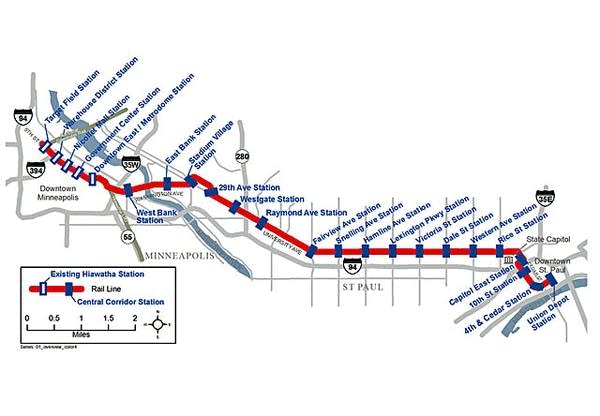Seeking to put light rail project on track
Go Deeper.
Create an account or log in to save stories.
Like this?
Thanks for liking this story! We have added it to a list of your favorite stories.

Is light rail on University Avenue - also known as the Central Corridor project - on the ropes? Is it gasping for life?
"It absolutely is not in jeopardy," asserts, state Rep. Alice Hausman, DFL-St. Paul, who chairs the House committee that oversees bonding requests. She's an ardent supporter of the Central Corridor project.
It is the only way that east Metro and west Metro connect
The proposed rail transit link enjoys broad support among a range of Twin Cities lawmakers and county commissioners.
Hausman says she's confident the line will be built is because there's wide agreement it's the next step in an overall regional transit system.
Turn Up Your Support
MPR News helps you turn down the noise and build shared understanding. Turn up your support for this public resource and keep trusted journalism accessible to all.
"It is the only way that east Metro and west Metro connect," she says.
The Metropolitan Council is the agency doing what's called the preliminary engineering for the light rail line.
Met Council chairman Peter Bell echoes Hausman's confidence the line will be built.
However there is a problem.
Supporters want lawmakers to approve borrowing authority for medium to large size bites of the project. Because there's competition for money at the Capitol, the bites are easier to win approval for than one big gulp.
The supporters wanted lawmakers and the governor to approve $40 million borrowing this past session and then OK another $100 million next session to keep the $900 million project on schedule.
The governor's veto of the bonding package has Hausman urging him to call a special session to reconsider the measure, among other issues.
Otherwise, the light rail borrowing request for next session would total $140 million.
Hausman doesn't relish asking for that much money all at once when there'll be a blizzard of requests from higher education, environment, road and bridge supporters and a host of interests asking for money.
So far, Gov. Tim Pawlenty has been cool to the idea of a special session, but has left open the possibility if lawmakers can negotiate deals first. He has not signaled, however, that light rail would be a priority of his.
In the meantime, Hennepin and Ramsey County officials advanced their planned spending on the project to help keep the cash flowing.
The Met Council's Peter Bell says his agency is looking at short term financing ideas including borrowing against money the Met Council gets from the motor vehicle sales tax, or MVST, in case lawmakers and the governor can't agree on a special session for a bonding bill.
"Maybe we can bond against some of our MVST receipts and handle some of the capital costs that way," Bell says. "We're looking at a number of different creative ways in which we can find the capital for the Central Corridor.
Bell says the goal is to keep the University Avenue light rail project on schedule.
Why? Two reasons.
First, a delay is expensive. Concrete, steel and other construction material costs are rising at three to five times the rate of inflation.
Hennepin County Commissioner Peter McLaughlin, another light rail supporter, says a one-year delay for the Central Corridor project would add about $35 million to the cost.
The other reason is more worrisome.
The Federal Transit Administration, the agency which ultimately will be asked to finance half of the total cost, might get cold feet.
The Met Council's Peter Bell doesn't think that will happen. He says for the moment the FTA is satisfied with Central Corridor's progress.
Hennepin County's Peter McLaughlin says he's relatively confident the Central Corridor light rail project will ultimately win FTA approval because the projected 40,000 riders a day it would carry would make it the busiest light rail line in the country.
However, McLaughlin warns, the FTA's patience is not infinite nor its pocketbook bottomless.
"There are so many projects around the country clamoring for federal money if we just stumble ever so slightly somebody else is going to get ahead of us and that is not a good thing," McGlaughlin says.
Construction on the Central Corridor light rail project would begin in 2010 under the current plan, with trains running by 2014.
Dear reader,
Political debates with family or friends can get heated. But what if there was a way to handle them better?
You can learn how to have civil political conversations with our new e-book!
Download our free e-book, Talking Sense: Have Hard Political Conversations, Better, and learn how to talk without the tension.





